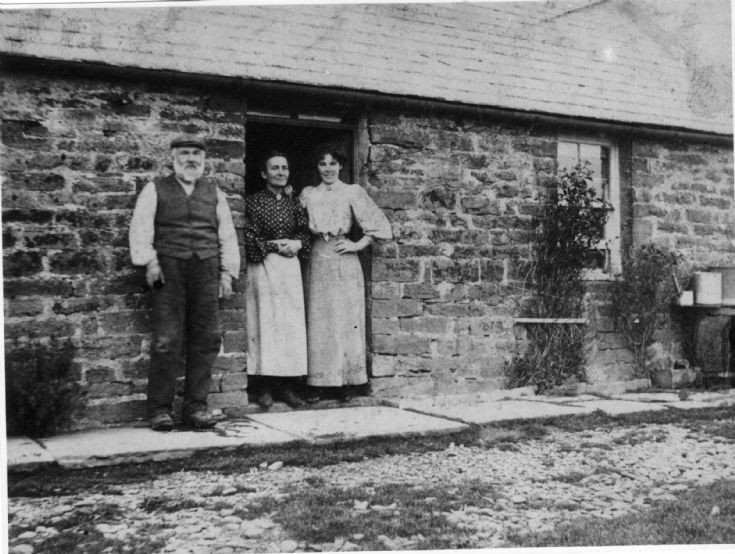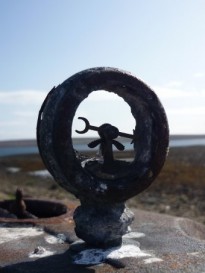There are many ancestors that I’d like to quiz over a meal, but I feel my great grandmother Tomima Groundwater really deserves some spoiling as well as quizzing. So she’s the topic of this week’s #52ancestors challenge: invite to dinner.
Who was she?
Tomima Groundwater was born on 16 February 1851 the second child and first daughter of John Groundwater and his wife Williamina Moncrieff. John was a mason and farmer living in Clestrain, Orphir, Orkney. By time her brother John was born on 11 June 1858 the family was at Scorridale, the home until both parents died. The house had one of the finest views in Orkney but the land was poor.
With nine younger siblings, two of whom died in infancy, life can’t have been easy. At the 1871 census Tomima was working as a domestic servant in Kirkwall, in the household of William S Heddle. On 24 August 1876 she married William H Slater, a farmer and joiner, from Gara, Orphir, a croft of around 20 acres. (It’s Gerra, reflecting Orkney pronunciation, on this map.)

William, Tomima and Annie Slater, at Gara.
They had 10 children between 1877 and 1896 including my grandfather James, all of whom lived to adulthood. William died in 1913; Tomima outlived him by over 27 years and died on 9 November 1940.
Why I want to invite her
Partly because she had a really tough life. She’s not alone in that but her circumstances were particularly challenging. Ten children in less than 20 years, small house, not a lot of money, all not unusual. But only weeks before the birth of the eighth child the family had to apply for poor relief because William was “wholly disabled due to insanity” (Orphir Parochial Board. General Register of the Poor. CO10/6/4. Orkney Archives). Severely depressed in today’s more restrained language. He “recovered” after a few weeks but they must have been desperate to even apply.
Those 10 children scattered: one to Australia, two to Canada (one died in his early 20s) and my grandfather to New Zealand for eight years. Again, not very unusual for Orkney in the early 20th century. Annie, pictured above, was the only one who lived her entire life in Orkney. The other five moved to mainland Scotland. One son John returned after a few years while Tomima, the youngest daughter, came back towards the end of her working life. A reflection of hard times at home and opportunities elsewhere. The oldest, William, died as the result of an accident in the Glasgow docks in 1923.
As the family grew up and set up their own homes, life probably became a little easier, until 1913 that is. On 5 June 1913 Tomima’s husband William died following a brain haemorrhage about a fortnight earlier. It was daughter Annie’s wedding day too. Only three months later, on 6 September, Tomima’s daughter-in-law Ellen, wife of John, died five days after giving birth to a daughter. What were John’s options? Take her home to Tomima who at 62 was then faced with the care of yet another child. Two sons also emigrated that year so it must have been a grim period for her.
Despite all the hardships she lived to be over 89 and the cause of death was recorded as “Senility, no regular medical attendant”.
What I’d ask her
“How did you cope?” is a big question. Did you ever envy your sisters who moved down south? Or your daughters with easier lives, one of them a university graduate and teacher? How did you feel when you voted for the first time? What stories did your mother and your Moncrieff grandmother tell you? Do you know why the Groundwater descendants all hold to the story that we were done out of the Houton estate? And what about your name, were you named after your uncle Thomas Groundwater who may have died at Lemvig in 1866 if that note on a scrap of paper is correct? And that’s just for starters (sorry couldn’t resist the pun, dinner… Ok)


What a lovely photo. Despite their hard lives, your ancestors look so friendly and kind and I'd be very happy to be a guest at the imaginary dinner to hear Tomina's stories!
My own dinner guest would have to be my 4x great grandfather and SSPCK schoolmaster, William Sinclair who blotted his copybook at both Flotta and Stroma Schools.
Thanks. She was an attractive woman indeed. Can I join your dinner too? Checking the dates it is possible that William Sinclair taught my great great grandfather Hugh Rosie or Ross who born in Stroma in 1816 or so.
William was on Stroma from 1811 till 1828 when he was dismissed, so he would definitely have taught your ancestor! Here is part of the inspector's report. Not sure if I gave that to you before.
Patrick Butter's journal: Stroma School report: 29 July 1824 http://www.scran.ac.uk website Butter recorded 18 pupils present at Stroma School when he visited and 52 had attended during the winter. The teacher, who was 61 years old, had 21 years' service with the SSPCK. His house and school were in good repair. There was no other school on the island nor any Sabbath evening school. Neither the parish minister or the Presbytery had visited the island for the last two years. Most people could read and all the children spent some of the year at school. According to Butter the local people were all professed smugglers and the teacher sold whisky from his house.